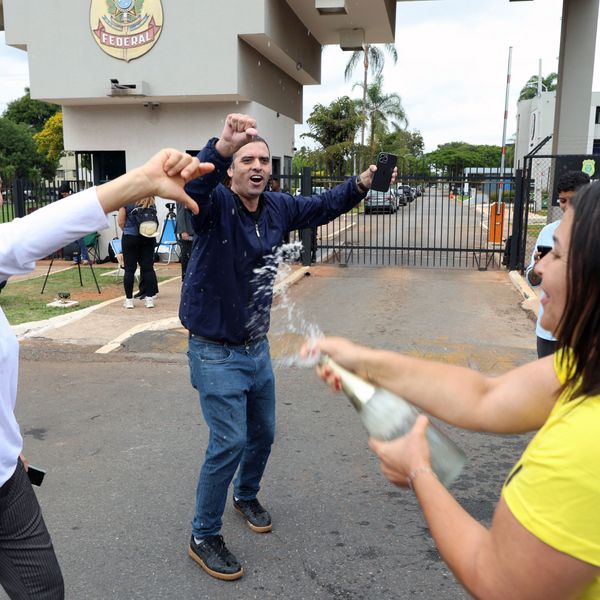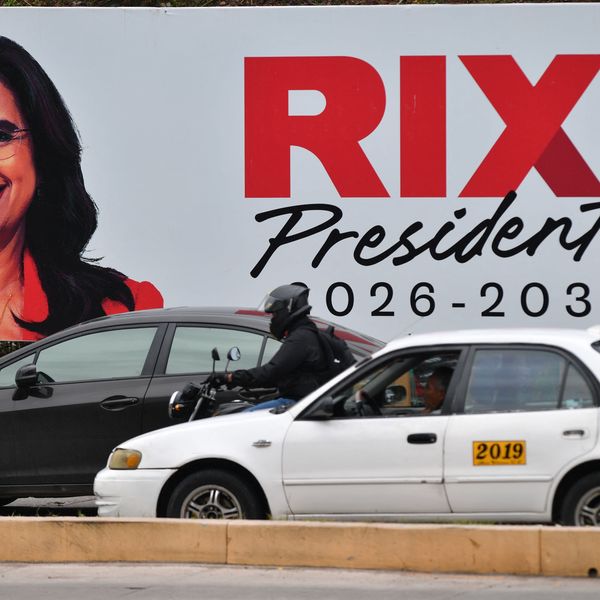Brazil Socialist Presidential Nominee Marina Silva Spikes in Polls
Former environment minister leading challenger for Brazilian presidency
Marina Silva, former environmental minister of Brazil whose populist appeal has resulted in surging poll numbers and a wave of new voter interest in the election, last week became the presidential nominee of the country's Socialist Party and the frontrunner to challenge current President Dilma Rousseff.
Silva replaced the party's previous nominee and her former running mate, Eduardo Campos, who died in a plane crash last week.
Figures from an initial poll conducted by the Brazilian Institute of Public Opinion and Statistics (IBOPE) showed Rousseff at 34 percent and Silva at 29, but data suggested Silva would beat Rousseff in a second round vote. Rousseff's figures were down from the 38 percent she held earlier this month. Senator Aecio Neves, the only other candidate likely to pose a challenge to Rousseff, also saw his points decline since Silva's nomination. Analysts said that undecided voters are starting to lean in Silva's favor, as well as Brazil's growing evangelical Christian population, and young, educated city-dwellers.
Silva, whose conservation campaigns as a senator helped decrease deforestation in the Amazon by 59 percent between 2004 and 2007, is seen by many as an anti-establishment politician with strong, populist ethics. She was born to an impoverished family in the Amazon and learned to read as a teenager before becoming the first rubber tapper ever elected to Brazil's federal senate.
Reuters writes:
"Marina has become the No. 1 factor in the election," said a Rousseff campaign official who asked not to be named. Silva has become the catalyst of opposition sentiment, but now she will become the target of all the candidates, he said. "We have to see what the other campaigns will do to deconstruct her."
In a televised debate on Tuesday with President Rousseff, Silva said she wanted to govern "with the best."
"I recognize that there are good people in all parties, but that the good guys are on the bench," she said. Silva's running mate is Beto Albuquerque, a legislator from Rio Grande do Sul with strong ties to agriculture lobbyists.
An Urgent Message From Our Co-Founder
Dear Common Dreams reader, The U.S. is on a fast track to authoritarianism like nothing I've ever seen. Meanwhile, corporate news outlets are utterly capitulating to Trump, twisting their coverage to avoid drawing his ire while lining up to stuff cash in his pockets. That's why I believe that Common Dreams is doing the best and most consequential reporting that we've ever done. Our small but mighty team is a progressive reporting powerhouse, covering the news every day that the corporate media never will. Our mission has always been simple: To inform. To inspire. And to ignite change for the common good. Now here's the key piece that I want all our readers to understand: None of this would be possible without your financial support. That's not just some fundraising cliche. It's the absolute and literal truth. We don't accept corporate advertising and never will. We don't have a paywall because we don't think people should be blocked from critical news based on their ability to pay. Everything we do is funded by the donations of readers like you. Will you donate now to help power the nonprofit, independent reporting of Common Dreams? Thank you for being a vital member of our community. Together, we can keep independent journalism alive when it’s needed most. - Craig Brown, Co-founder |
Marina Silva, former environmental minister of Brazil whose populist appeal has resulted in surging poll numbers and a wave of new voter interest in the election, last week became the presidential nominee of the country's Socialist Party and the frontrunner to challenge current President Dilma Rousseff.
Silva replaced the party's previous nominee and her former running mate, Eduardo Campos, who died in a plane crash last week.
Figures from an initial poll conducted by the Brazilian Institute of Public Opinion and Statistics (IBOPE) showed Rousseff at 34 percent and Silva at 29, but data suggested Silva would beat Rousseff in a second round vote. Rousseff's figures were down from the 38 percent she held earlier this month. Senator Aecio Neves, the only other candidate likely to pose a challenge to Rousseff, also saw his points decline since Silva's nomination. Analysts said that undecided voters are starting to lean in Silva's favor, as well as Brazil's growing evangelical Christian population, and young, educated city-dwellers.
Silva, whose conservation campaigns as a senator helped decrease deforestation in the Amazon by 59 percent between 2004 and 2007, is seen by many as an anti-establishment politician with strong, populist ethics. She was born to an impoverished family in the Amazon and learned to read as a teenager before becoming the first rubber tapper ever elected to Brazil's federal senate.
Reuters writes:
"Marina has become the No. 1 factor in the election," said a Rousseff campaign official who asked not to be named. Silva has become the catalyst of opposition sentiment, but now she will become the target of all the candidates, he said. "We have to see what the other campaigns will do to deconstruct her."
In a televised debate on Tuesday with President Rousseff, Silva said she wanted to govern "with the best."
"I recognize that there are good people in all parties, but that the good guys are on the bench," she said. Silva's running mate is Beto Albuquerque, a legislator from Rio Grande do Sul with strong ties to agriculture lobbyists.
Marina Silva, former environmental minister of Brazil whose populist appeal has resulted in surging poll numbers and a wave of new voter interest in the election, last week became the presidential nominee of the country's Socialist Party and the frontrunner to challenge current President Dilma Rousseff.
Silva replaced the party's previous nominee and her former running mate, Eduardo Campos, who died in a plane crash last week.
Figures from an initial poll conducted by the Brazilian Institute of Public Opinion and Statistics (IBOPE) showed Rousseff at 34 percent and Silva at 29, but data suggested Silva would beat Rousseff in a second round vote. Rousseff's figures were down from the 38 percent she held earlier this month. Senator Aecio Neves, the only other candidate likely to pose a challenge to Rousseff, also saw his points decline since Silva's nomination. Analysts said that undecided voters are starting to lean in Silva's favor, as well as Brazil's growing evangelical Christian population, and young, educated city-dwellers.
Silva, whose conservation campaigns as a senator helped decrease deforestation in the Amazon by 59 percent between 2004 and 2007, is seen by many as an anti-establishment politician with strong, populist ethics. She was born to an impoverished family in the Amazon and learned to read as a teenager before becoming the first rubber tapper ever elected to Brazil's federal senate.
Reuters writes:
"Marina has become the No. 1 factor in the election," said a Rousseff campaign official who asked not to be named. Silva has become the catalyst of opposition sentiment, but now she will become the target of all the candidates, he said. "We have to see what the other campaigns will do to deconstruct her."
In a televised debate on Tuesday with President Rousseff, Silva said she wanted to govern "with the best."
"I recognize that there are good people in all parties, but that the good guys are on the bench," she said. Silva's running mate is Beto Albuquerque, a legislator from Rio Grande do Sul with strong ties to agriculture lobbyists.

